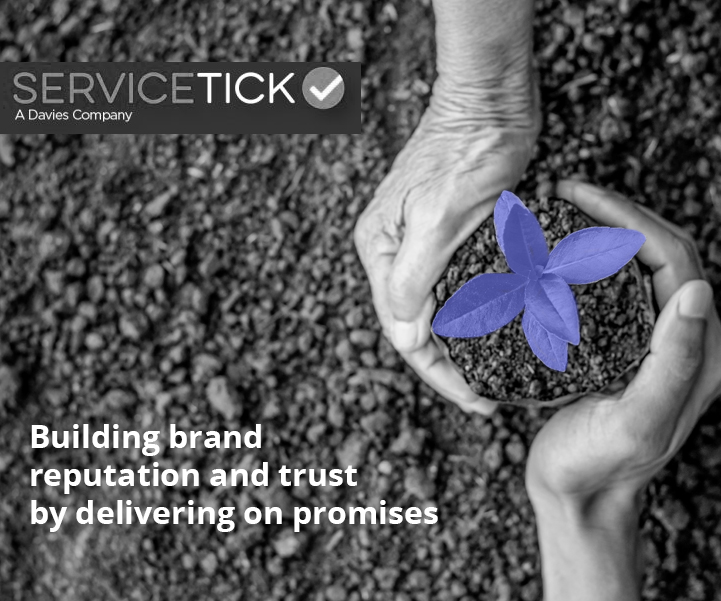National Customer service week – Day 5
11th October 2019

Building brand reputation and trust by delivering on promises
Each year Interbrand, Forbes and Brand Finance publish a list of the strongest brands in the world. Although never in quite the same order the same brands pop up in the top ten of all three lists – Apple, Google, Coca Cola, Amazon, Disney. They are brands that have lived by the four principles of brand management – remaining true to a core ideology; enjoying strong leadership; benefiting from engaged employees; and pursuing a customer-centric culture. But how do successful brands bring such principles to life? Here are seven steps that many of them take :
Strategies aligned with core ideology – The best brands ensure all their strategies are fully aligned with their core ideology. They recognise that vision, mission and values are not worth the paper they are printed on unless they are enacted throughout the organisation. Steve Jobs made design the primary ideology for Apple strategy and this simple strategic mantra has shaped Apple success for the past three decades. How closely aligned with your brand vision are your working practices?
Leadership by example – All strong brands have, at some point in their history, been led by a strong, visionary personality who evidenced the company’s core purpose in the actions they took. Walt Disney, for example, understood how litter could destroy the ambience of an attraction and determined that cleanliness would become a permanent characteristic of the Disney experience. Disney himself would pick up litter and, by demonstrating that this menial task was not beneath the man in charge, he set an example that is followed to this day.
Hire for attitude. Train for skills – make sure that you hire employees who have the right mindset. By ‘right mindset’ we mean people who match the values and behaviours that your brand wants to exhibit. SouthWest airlines consciously seek out people who want to: “have fun; don’t take themselves too seriously; enjoy their work, and are passionate team-players”. Having found them, they then teach them how to do the job. First Direct, who regularly top the charts for great customer service, ask potential recruits to take a personality quiz to ensure that they are right for First Direct (and First Direct is right for them).
Make sure your staff understand (and buy into) your brand promise – All your employees should know and be reminded regularly of why they come to work. Especially in a service industry, your people are the front line of your brand management programme. It’s their interactions with customers that will determine the way your brand is perceived – regardless of how brilliant your product or advertising is. Some years ago the Insurance company Commercial Union ran an award-winning advertising campaign that has since passed into the language (even though the company no longer exists). The slogan, “We won’t make a drama out of a crisis”, summarised the core proposition of their offer – to pay up when a claim was made. But the people who mattered most, the company’s claims teams, hadn’t bought into the concept. They were still operating under the rules of an old culture that sought to protect the company’s interests. The result was a disenfranchised workforce who felt they had been hung out to dry.
Freedom within a framework – While it’s important that your people enact your brand promise it’s equally important to allow them to express their character. In the thousands of pieces of feedback that ServiceTick gathers on behalf of its clients one of the consistently loudest customer complaints is about service agents reading from a script. By and large, customers do not like to interact with automatons. Ethical cosmetics brand Lush (a regular top performer in customer experience) understands this need for ‘freedom within a framework’. The brand regularly campaigns on ethical issues but every Lush shop has the right to opt-out of a window campaign if they have strong reasons.
Put the customer at the heart of the experience – Customer experience is the perception that your customers have of their relationship with your company. It is NOT what you have decided they need. Customer centricity means operating as a business without silos. Customer centricity means engaging in regular dialogue with your customer – listening rather than telling is a good default mode. Customer centricity means putting your customers’ interests first. The rise of social media has empowered customers and switched the balance of power away from brands. Companies that ignore this shift will not long survive.
Personalise your service delivery – Customer centricity also means treating every customer as an individual with their own set of circumstances, wants and needs. As customers, we respond well to being addressed by name, to being recognised as a regular customer, to dealing with people who have time to chat (sometimes). Allow your customer-facing staff the freedom to recognise and respond to a customer’s mood. Give them a framework within which they can build confidence by taking initiative. Treat them as intelligent people and they will respond with intelligent behaviour.
Thanks for reading this series of blogs to celebrate National Customer service Week; and if you have any questions or comments please do get in touch.
Related Articles
-
- Article
- Insurance Solutions
Insurance, with no questions asked
This article was first published by Insurance Times. With one-third of…
-
- Interview
- Claims Solutions
- Insurance Solutions
CEO speaks as Davies Group revs up for overseas expansion
This article was written by Paul Lucas and first published in…
-
- Article
- Claims Solutions
National Customer service week – Day 4
Leadership: Championing customer service in the boardroom Each year Jeff Bezos…
-
- Report
- Insurance Solutions
Our Group CEO Dan Saulter speaks to Insurance Business about our strategy for 2020
After working in a variety of positions as a chartered accountant,…



